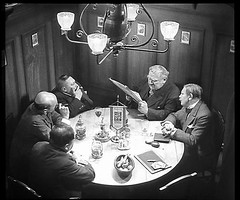In another sign that our nation is veering headlong into corporate facism, both the FCC and Congress are engaging in closed-door meetings with ISP's to re-write telecom law, most likely to limit effects of Net Neutrality. Net Neutrality, for those of you who have heard the term but are uncertain as to its meaning, is precisely what it says: that there be no restrictions used by those who provide the "pipes" for the Internet. In other words, An ISP must be neutral in allowing content through its pipes and cannot slow down access to or prevent users from access to online content.
Let me give you some personal, historical perspective. Years ago when AOL was still preeminent, AAR was not available to all of AOL's users. There was nothing as a content provider I could do about it. Indeed, I remember being stunned after speaking with somebody at AOL who told me, "We are not required to provide access to all websites online." Several years later, when a router in the Mid-West broke, AAR became unavailable for a good chunk of the country and the company that provided that router was not required to fix the break. Instead I was forced to pay AAR's host to create a fix around the break, and in the interim weeks, we lost untold thousands of users temporarily...and the number of users who simply thought we'd gone offline permanently remains unknown.
Let's jump to the future now, where Time/Warner exists and NBC and Comcast may be merging. Without Net Neutrality, when owners of the pipes that bring us content also own companies that generate large amounts of content, they can, quite legally, either slow down or stop the competition. In a case brought by Comcast against the FCC earlier this year, a federal appeals court stated that the FCC lacked the authority to require Net Neutrality, leading both the FCC and Congress scrambling to create some level of authority by regulation or law.
 As public agencies do when preparing to enact regulatory changes, the FCC asked for public comment regarding Net Neutrality. Although 85% of respondents asked for Net Neutrality, these closed-door meetings signal yet another Obama administration deal limiting real change. Similar opaque, revolving-door meetings on Capital Hill - where nearly 3/4 of telecom lobbyists are former federal employees - are yet another sign of business as usual.
As public agencies do when preparing to enact regulatory changes, the FCC asked for public comment regarding Net Neutrality. Although 85% of respondents asked for Net Neutrality, these closed-door meetings signal yet another Obama administration deal limiting real change. Similar opaque, revolving-door meetings on Capital Hill - where nearly 3/4 of telecom lobbyists are former federal employees - are yet another sign of business as usual.
 While I understand that changes are incremental and evolutionary rather than revolutionary, it pains me to say that Barack Obama's efforts to avoid conflict and create compromise too often benefit the industries in need to regulation. It's one thing to hold meetings with telecom companies, but closed-door meetings stink of back-room deals.
While I understand that changes are incremental and evolutionary rather than revolutionary, it pains me to say that Barack Obama's efforts to avoid conflict and create compromise too often benefit the industries in need to regulation. It's one thing to hold meetings with telecom companies, but closed-door meetings stink of back-room deals.
Where's the sunshine?
No comments:
Post a Comment